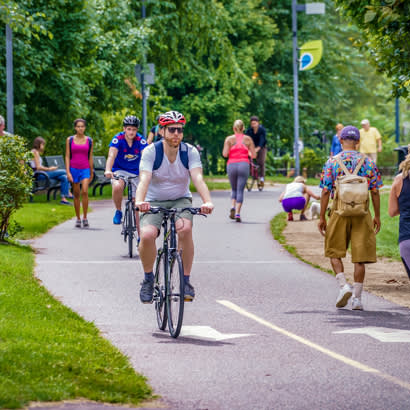
Pictured: Schuylkill River Trail. Photo credit: Visit Philadelphia.
This blog post originally appeared on the Pennsylvania Recreation and Park Society’s “Dig It!” blog.
Last year, I participated in a provoking thought exercise with my counterparts from other states. We attempted to develop an alternate term for “recreation and parks.”
Because recreation and parks means something different to practically every person, and carries unwanted baggage of being regarded as trivial, even laughable, and less worthy than more “important” things, we wanted to explore what single term could encompass all its comprehensive benefits.
Eleanor Warmack, CEO of the Florida Recreation and Park Association, declares, “If our industry was a corporation, we would have rebranded ourselves 20 times by now. This profession has evolved — we cannot keep using terminology from 100 years ago to limit what the public thinks of our value, nor to allow our profession to be defined by three words.”
Such a new term could indeed rebrand our entire industry and lead to universal recognition of its value! But whatever the word is, it must express all its connections to health and wellness, environmental sustainability, social equality, economic stimulation, infrastructure and resiliency, people development, community livability, and, of course, recreation and leisure services! (See Recreation & Parks’ Internet of Things, 50 Ways Parks and Recreation Pay Out Every Day, and Are We Building People—or Just Running Programs?)
Now hold that thought.
In the book The Blue Zones of Happiness, author Dan Buettner cites research from 141 countries to distill what contributes most to life satisfaction all over the world, and offers practical lessons to making happiness a personal lifestyle.
It’s fairly easy to be happy in any particular moment, of course. The challenge is to sustain an ongoing pursuit of what he calls the three P’s — purpose, pleasure and pride — the universal keys to life fulfillment, regardless of culture or personality. And while personal discipline can go only so far, Buettner advocates “for strategies that make changes to our surroundings...that constantly nudge us into doing the right things so we don’t have to remember them on our own.”
Our governments, communities and workplaces; our social networks, homes and finances; and even our inner lives can be “happier by design,” he asserts. Each of his designing blueprints for happiness enumerates specific action steps for advancing our personal and collective purpose, pleasure and pride.
In the book’s foreword, Ed Diener summarizes, “We now know that happiness is an essential part of functioning well, and that it gives a boost in well-being not only to individuals, but also to those around them, their communities, and their societies. Rather than being a luxury to be pursued only after we take care of the more important things in life, happiness is beneficial to everything else we desire: It aids our health and helps us live longer; it aids our social functioning and makes us better citizens; it helps us perform better at work; and it builds up our resilience, which enables us to bounce back after setbacks or when bad events occur in our lives. The happier we are, the better we are for our friends and family, our workplaces, our communities, and our society as a whole.”
Doesn’t this passage sound like what we strive for in providing recreation and park services?
Now back to the rebranding term for recreation and parks.
Our creative thought exercise was tough. We identified what we wanted the new phrase to embody. We noted that some park and recreation agencies are transitioning to alternate terms, like the Community Enrichment Department in St. Petersburg, Florida. We tried out new phrases. We even enlisted ChatGPT to invent a new word, which came up with such disastrous results as “recrarks,” “culturisure,” “leisureplex,” and “communivital.” Our discussion was quite stimulating, but so far, we’ve failed to invent anything that conveys so much so concisely.
But — doesn’t the above description of happiness come so very close? There might be a case for it. After all, its pursuit is singled out as an important tenet in one of our nation’s founding documents. And as everyone knows, it’s one of the inalienable rights of “We the People!”
What do you think? All comments and suggestions are welcome!
Tim Herd, CPRE, is the CEO of the Pennsylvania Recreation and Park Society.


